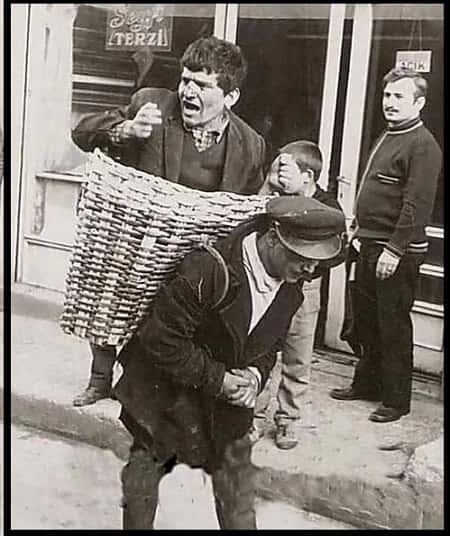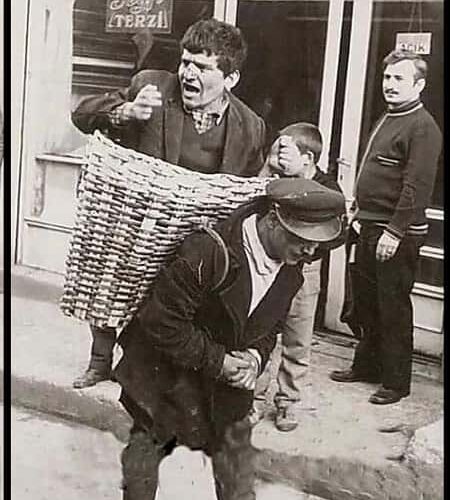The Turkish Basket Men Who Helped Drunk People Get Home

In the 1960s, long before taxis, Ubers, or designated driving services became common, Turkey had a unique and creative way to help people who drank too much.
These helpers were called “küfeci” (pronounced “koo-FEH-ji”), which translates to “basket men.” They had an unusual job: carrying drunk people home in large baskets. The name comes from the word “küfe,” meaning a big basket, and it also inspired a saying: “Küfelik olmak,” which means “to be so drunk you need to be carried home in a basket.”
Who Were the Basket Men?
Küfeci were not full-time professionals in this job. During the day, they worked as porters, carrying heavy loads like bags, goods, or luggage for people. This was already a physically demanding job, but at night, they took on an additional role. Instead of carrying bags, they carried drunk individuals who couldn’t make their way home on their own.
How Did It Work?
When a customer drank too much at a pub and could no longer walk, it was the pub owner’s responsibility to make sure the person got home safely. Instead of leaving the drunk person outside or letting them wander, the pub owner would call a küfeci. These basket men would arrive with their large baskets, place the drunk person inside, and carry them all the way home.
The drunks themselves did not hire the küfeci—after all, they were too intoxicated to make such decisions. The entire arrangement was handled by the pub owners. It was an efficient system that allowed the pub to close for the night while ensuring customers were looked after.
Why Did People Become Basket Men?
The job was tough, but it provided an extra source of income. Porters were already used to carrying heavy loads, so carrying a drunk person wasn’t too different, although it may have been more awkward! For these men, it was a way to earn additional money in the evenings when they were not busy with their daytime work.
However, carrying an adult in a basket was no easy task. These porters had to be physically strong to lift the person, place them securely in the basket, and then transport them, sometimes over long distances. In some cases, the pub staff might have helped the küfeci by lifting the drunk person into the basket before the journey began.
The Küfeci System: Unusual but Practical
This unique system may seem strange today, but it made sense for the time. Public transportation was not as developed as it is now, and personal cars were not as common. Walking was the primary way to get around, but if someone was too drunk to walk, they risked getting lost, hurt, or even robbed. The küfeci played a vital role in ensuring the safety of these individuals.
It’s also interesting to think about the logistics. How did the basket men know where to take the drunk person? It’s likely that the pub owners or friends of the intoxicated person gave directions to the küfeci. Sometimes, regular customers might have been well-known to the pub owners, who already knew their addresses.
A Glimpse Into the Past
The idea of küfeci reflects a time when communities found creative solutions to everyday problems. It also highlights the resourcefulness of people who worked hard to earn a living. While the job of a basket man may not exist today, it remains a fascinating part of Turkish history and culture.
This story also serves as a reminder of how much society has changed over the years. Today, we have technology like ride-sharing apps and services to help people get home safely after a night out. But back in the 1960s, the küfeci were the unsung heroes who ensured that everyone made it home in one piece.
The End of the Basket Men
As cities modernized and transportation options improved, the need for küfeci gradually disappeared. Taxis became more accessible, and people began to rely on them to get home after drinking. Eventually, the role of the basket men faded into history. Today, it’s a story that brings a smile and offers a glimpse into a simpler but resourceful time.
Final Thoughts
The küfeci were more than just porters or helpers; they were problem-solvers who provided an essential service in their communities. Their story is a testament to human creativity and resilience in finding solutions to everyday challenges. While their job may seem unusual now, it was a practical and effective way to ensure safety in a time when options were limited.
Even though this chapter of history is closed, it’s fascinating to learn about how people adapted to the circumstances of their time. The küfeci will always remain a memorable part of Turkish culture, reminding us of the value of hard work and community care.
Frequently Asked Questions (FAQ) About the Turkish Basket Men
1. Who were the Turkish basket men, or küfeci?
The Turkish basket men, known as *küfeci*, were porters in the 1960s who carried drunk people home in large baskets. They typically worked during the day as porters, carrying goods or luggage, and took on this unique side job at night to earn extra income.
2. Why were they called "basket men"?
The term *küfeci* comes from the Turkish word *küfe*, meaning "basket." This name referred to their method of transporting drunk individuals home using large baskets. The phrase *"küfelik olmak"* (meaning “to be so drunk you need to be carried in a basket”) also stems from this practice.
3. How did the system work?
When a pub customer drank too much and couldn’t walk home, the pub owner would call a basket man. The küfeci would arrive, put the drunk person in a large basket, and carry them home. The service ensured that the customer got home safely, and the pub could close for the night without worrying about leaving anyone behind.
4. Did the drunk people hire the küfeci themselves?
No, the drunk people did not hire the küfeci directly. Usually, they were too intoxicated to make any decisions. Instead, the pub owners arranged for the basket men to take them home.
5. What kind of people became küfeci?
Most küfeci were porters who already worked during the day carrying goods. They took on this nighttime role as a way to earn extra money. They were typically strong individuals capable of carrying heavy loads, including full-grown adults.
6. How did the küfeci know where to take the drunk person?
The pub owners or the friends of the drunk person would usually provide directions to the küfeci. In some cases, the person might have been a regular customer, and the pub owner already knew their address.
7. Was it common for people to need this service?
Yes, it was fairly common in the 1960s, especially in urban areas where nightlife was popular, and there were limited transportation options for people who drank too much.
8. Why was this service necessary in the 1960s?
At that time, public transportation was not as developed, personal cars were not widespread, and there were no taxis or ride-sharing services like today. The küfeci provided a practical and reliable solution for getting drunk people home safely.
9. How did they transport people in baskets?
The drunk person would be placed securely in a large, sturdy basket. Sometimes, pub staff or other helpers might assist in getting the person into the basket. The küfeci would then carry the basket on their back and walk to the person’s home.
10. How long did this practice last?
The role of the basket men declined as cities modernized. With the rise of taxis, better public transportation, and later, ride-sharing services, the need for küfeci disappeared. By the late 20th century, this unique service had faded into history.
11. Are there any modern equivalents to the küfeci?
Today, services like taxis, Ubers, and designated driver programs serve a similar purpose by ensuring that intoxicated individuals can get home safely. However, these modern solutions don’t involve carrying people in baskets!
12. What can we learn from the story of the basket men?
The story of the basket men highlights the creativity and resourcefulness of communities in solving everyday problems. It also shows how people cared for one another, even in unconventional ways, during a time when modern conveniences were unavailable.
13. Is the concept of küfeci remembered in Turkey today?
Yes, the concept is remembered as a unique and quirky part of Turkish history. It’s often mentioned in discussions about how society and daily life have evolved over the years.
14. What happened to the küfeci after their role ended?
As the need for this service disappeared, the küfeci returned to their primary jobs as porters or found other work. Their role in carrying drunk individuals is now a story from the past, remembered fondly as an example of a bygone era.

